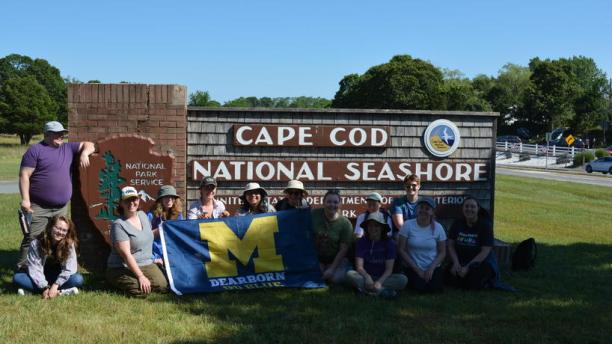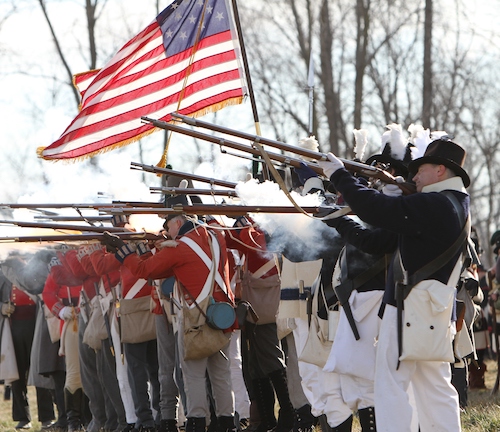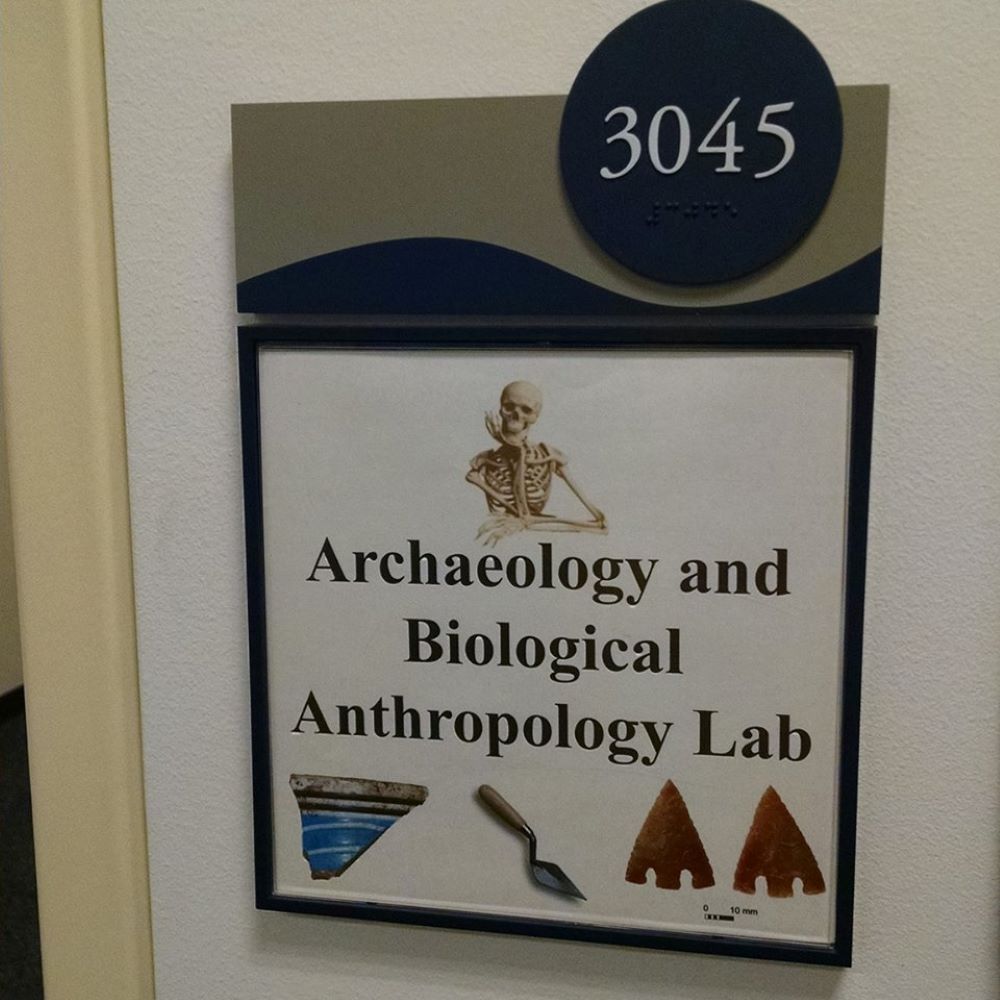Archaeology
Archaeology is the study of the human material world over space and time. While the word usually brings to mind far-off, exotic places, very ancient cultures, and often spectacular finds, in fact, archaeology is usually much more mundane, but it is also much more relevant. In Historical Archaeology, focusing on the last 500 years, we study the same important cultural questions as our colleagues in Cultural and Biological anthropology. We aim to understand how people interact, form communities, and how race, religion, gender, class all work. The only difference is that we do this by looking at things: material culture.
Follow UM-Dearborn Archaeology on facebook for updates and news!

Archaeology Classes
Even though most Archaeology students at Dearborn take these classes on the way to some other career, they provide useful, transferrable experiences doing real, primary, scientific research, with all the messiness that entails. Students going into law, medicine, education, engineering and other fields benefit from getting excited about a project and seeing where it takes them. Even if it deals with mundane bits of old trash, Archaeology can often be the area which invites them to take ownership over their own education!
This class is taught about 50% online, so meets less often on campus. Through hands-on labs and a comparison of different sites and research projects, this class provides a survey of the theoretical concepts and methods archaeological anthropologists use to learn about people through material things. Recommended for students intending to sign up for a field school in the summer or fall. 3 credits.
Fulfills “Social and Behavioral Analysis” and “Critical and Creative Thinking” requirements for “Dearborn Discovery Core.” Taught every Winter.
This class is taught all online except for two in-person exams (may use testing center if >50 miles from campus). Uses archaeological evidence from all over the world (Peru, China, Egypt, Iraq, Tanzania, Australia, and the Americas) to explore issues of central importance to the present, such as the biological evolution of our species, the creation of new technologies, the switch to farming, the rise of social inequality, and the beginnings of cities. 3 credits.
Fulfills “Intersections,” “Social and Behavioral Analysis” and “Critical and Creative Thinking” requirements for “Dearborn Discovery Core.” Taught every Winter.
“The past is not neutral.” As a class focusing on argumentative writing skills, this class explores this statement, seeking to recognize how representations of and stories about the past play a role in modern political discussions and debates. Considers archaeological sites and controversies in Asia, Africa, the Mideast, and the US. 3 credits.
Fulfills “Humanities,” “Social and Behavioral Analysis” and “Upper Level Writing” requirements for “Dearborn Discovery Core.” Taught every Fall.
Students can take a one-credit “lab work” study, learning to conserve and catalog archaeological materials, a more extensive “special topics” study about a time or place of interest, or even develop their own substantial project, which may lead to conference papers or publications.
May be arranged any term.
Learn the methods and techniques of field archaeology and laboratory work by participating in a primary archaeological research project. Includes excavation, survey, mapping, historical research, and/or artifact analysis. 3 credits.
Fulfills “Social and Behavioral Analysis” requirement for “Dearborn Discovery Core.” Taught most Falls.
River Raisin Archaeology Project, Monroe, MI

In partnership with the City of Monroe and River Raisin National Battlefield Park, we have started a long-term archaeological field project on this important site dating 1780s-1813. We are uncovering the story of the multiethnic French, British, and Native community that traded and farmed here, but was often unable to write their own history.
The site is also the scene of the January 1813 Battles of the River Raisin, part of the War of 1812, which were pivotal for the “Old Northwest” and one of the greatest military disasters in US history, in which only 32 of one thousand US troops escaped.
Take a look at this short (~8 min) video on the project, and join us to excavate Fridays, each fall!
To Join us Excavating! Here’s How:
To work on the project, you need to be registered in ANTH 410: The Archaeological Field School, which is offered most Fall semesters, one day per week, Fridays. Usually we meet in Monroe at the site but also in the lab on campus at Dearborn in bad weather. We will make every effort to arrange car-pooling for students without their own transportation.
- Current UM-Dearborn Students. Search for the class in the current course catalog and simply register!
- Current UM-Ann Arbor, UM-Flint students. Use the Guest Student page and select “Undergraduate Guest/Consortium Agreement” when enrolling. You’ll transfer your credits back to your home school after the class, and you should consult with your financial aid adviser before enrolling to ensure that enrollment at two campuses won’t cause a problem.
- Current students at any other College or University. Use the Guest Student page and select “Undergraduate Guest” when enrolling. You’ll transfer your credits back to your home school after the class, and you should consult with your financial aid adviser before enrolling to ensure that enrollment at two campuses won’t cause a problem.
- UM-Dearborn Alumni may take classes under the Alumni Enrichment program for the substantially discounted rate of $84/credit (2021-22)
- Seniors/Retirees wishing to enroll as guests also get a substantial discount, currently $140/credit (2021-22). See the information for the Retired Person Studies Program.
- Members of the Community wishing to enroll as guests. Use the guidance on the “Personal Enrichment” webpage or the Prospective Degree webpage, or, for anyone else the Non-Degree, Returning, and Other Students page.
Email John Chenoweth with questions!
CASL Archaeology Lab

UM-Dearborn's Archaeological Lab, in CASL room 3045, hosts research projects on a wide variety of sites and topics from the Caribbean to right here in Dearborn! The focus is on the study of human beings through material culture throughout the historic period (about the last 500 years), particularly in the Caribbean, New England, and in Michigan.
Students can take part in these in a number of ways! Students are using the lab as part of independent study projects (ANTH 398/399), in lab-based classes such as ANTH 201 (Introduction to Archaeology) and as part of the fall Archaeological Field School Class, ANTH 410. Current work includes the analysis of artifacts from several 18th and 19th century sites in the British Virgin Islands, a collection on loan from the Dearborn Historical Museum from the Dearborn Arsenal Building, material from Cape Cod National Seashore, and several other sites in Michigan.
About Me

John M. Chenoweth, PhD, RPA (#15941)
Associate Professor of Anthropology
Email: jmchenow (at) umich.edu
Office: 3045F CASL Building
Lab: 3045 CASL Building
Tel: 313-583-6368
I'm anthropologist and historical archaeologist studying the archaeology of religion, social identity, practice theory, and the negotiation of conflicts between religion, race, and class. My work combines archaeological and documentary evidence to understand daily life and has focused on the Caribbean, especially the British Virgin Islands and their interactions across the Atlantic World, as well as New England and Michigan. I’ve worked on sites dating to the 17th century, 18th century, 19th century, and even the 21st century!
I was honored to be the recipient of the 2019 John L. Cotter Award for “outstanding achievement by an individual at the start of his/her career in historical archaeology” awarded by the Society for Historical Archaeology.
Here's my academic interest summary and background:
- Bachelor's New York University (2001)
- MA University of Pennsylvania (2006)
- PhD University of California-Berkeley (2011)
- Post-doc Stanford (2011-2013)
- The River Raisin Archaeology Project (2019-present, see above).
- Early New England environmental and social change on Cape Cod (1644-1800).
- Several Caribbean studies of members of the Religious Society of Friends (“Quakers”) who, despite ideals of equality and pacifism, held enslaved Africans.
- The Archaeology of Quakerism across the Atlantic World
- The Free Church site in Superior Township, MI
- Contemporary archaeological studies of the material culture of religion, and also modern understandings of “nature” and “culture” and their impact on environmentalism in National Parks.
- GIS Analysis of historic maps along with modern archaeological and remote sensing data
- Materials science-related analyses of historical artifacts, primarily focusing on the mechanical measurement of color in 18th and 19th century refined earthenwares using spectrophotometric analysis.
I've published in journals such as American Anthropologist, Historical Archaeology, the International Journal of Historical Archaeology, and the Journal of Social Archaeology, and have published several edited volumes and chapters.
Monographs
2017. Simplicity, Equality, and Slavery: An Archaeology of Quakerism in the British Virgin Islands, 1740-1780. University of Florida Press.
Reviewed in Historical Archaeology and AAR’s Reading Religion
Peer-Reviewed Chapters and Articles
2021. (Chenoweth, John M., Laura Bossio, and Mark Salvatore). Modeling Colonial Paternalism: GIS and Multi-Spectral Satellite Imagery at Kingstown, British Virgin Islands. American Antiquity. (First published online August 3, 2021)
2021. Spatial Analysis of Religious Community: An Integrated Approach to Barbados Quakerism, 1655–1780. Historical Archaeology 55(4). (First published online Aug 17, 2021)
2021 “In the Beginning Was the Word”: Religious Communities, Religious Landscapes. Historical Archaeology 55(4). (First published online Aug 17, 2021)
2020. (Wilkie, Laurie A. and John M. Chenoweth). “Introduction: Continuities and Changes.” In A Cultural History of Objects Volume Six: The Modern World, Laurie A. Wilkie and John M. Chenoweth, eds. London: Bloomsbury. (Published Dec 24, 2020)
2019. Reconstructing a Changing Religious Landscape: the Material Traces of Barbados Quakers. International Journal of Historical Archaeology. 23(2): 462-495.
2018. Marine Shell and Small Island Slavery in the Caribbean. Historical Archaeology 52(4): 467-488.
2017. Natural Graffiti and Cultural Plants: A Contemporary Archaeology of Yosemite and Detroit. American Anthropologist 119(3): 464-477.
2016. (Chenoweth, John M., Lynsey Bates, and James Delle) Introduction: The Caribbean Spaces In Between. In Archaeologies of Slavery and Freedom in the Caribbean: Exploring the Spaces in Between. Bates, Lynsey, John Chenoweth, and James Delle, eds. University Press of Florida.
2016. The Archaeology of a Postemancipation Smallholder in the British Virgin Islands. In Archaeologies of Slavery and Freedom in the Caribbean: Exploring the Spaces in Between. Bates, Lynsey, John Chenoweth, and James Delle, eds. University Press of Florida.
2016. Collecting, Updating, and Building on the Classics. In The Historical Archaeology Laboratory Handbook. John M. Chenoweth, ed. Society for Historical Archaeology.
2016. (Chenoweth, John M. and Meta Janowitz) A Primer on Historic Ceramics. In The Historical Archaeology Laboratory Handbook. John M. Chenoweth, ed. Society for Historical Archaeology.*
*Peer-reviewed by SHA editors, but anonymous peer reviewer later became a collaborator and the resulting piece was not sent for further blind peer review.
2015. (Chenoweth, John M, and Alan Farahani) Color in historical ceramic typologies: A test case in statistical analysis of replicable measurements. Journal of Archaeological Science: Reports. 4: 310-319.
2014. Practicing and Preaching Quakerism: Creating a Religion of Peace on a Slavery-Era Plantation. American Anthropologist 116(1): 94-109.
2013. The Archaeology of Quakerism in Philadelphia and Beyond: Identity, Context, and Conformity. In Kings and Commoners, Settlers and Savants: The Historical Archaeology of the Delaware Valley, 1600-1820. R. Veit and D. Orr, eds. Knoxville: University of Tennessee Press. Pp. 185-204.
2012. Quakerism and the Lack of ‘Things’ in the Early Modern. In The Mystery and Meaning of Modern Materials: Selected Papers from the 2009 CHAT Conference, Keble College, Oxford. L. McAtackney and B. Fortenberry, eds. BAR, Oxford. Pp. 73-84.
2009 Social Identity, Material Culture, and the Archaeology of Religion: Quaker Practices in Context. Journal of Social Archaeology 9 (3): 319-340.
2006 “What’ll Thou Have”: Quakers and the Characterization of Tavern Sites in Colonial Philadelphia. Northeast Historical Archaeology 35: 75-90.
Edited Volumes
Chenoweth, John M., guest editor. 2021. Historical Archaeology 55(4). (First published online Aug 17, 2021)
Wilkie, Laurie A., and John Chenoweth, eds. 2020. A Cultural History of Objects, Volume Six: Objects in the Modern Age. London: Bloomsbury. (Published Dec 24, 2020)
Chenoweth, John M., ed. 2016. The Historical Archaeology Laboratory Handbook. Society for Historical Archaeology [3 volumes], Germantown, MD. (Three volumes of previously published material, in addition to two original pieces authored or co-authored by myself.)
Bates, Lynsey, John M. Chenoweth, and James Delle, eds. 2016. Archaeologies of Slavery and Freedom in the Caribbean: Exploring the Spaces in Between. University Press of Florida. Reprinted in paperback, Sept 2018.
Department of Behavioral Sciences
4901 Evergreen Road
Dearborn, MI 48128
View on Map
